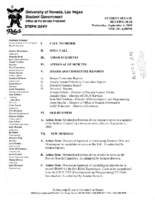Search the Special Collections and Archives Portal
Search Results
Adelaide Robbins oral history interview
Identifier
Abstract
Oral history interview with Adelaide Robbins conducted by Lisa Gioia-Acres on April 18, 2008 and April 29, 2008 for the All That Jazz Oral History Project. Robbins discusses her experience in piano lessons at age six and having a professional career by the age of 12. Robbins also discusses playing many Las Vegas, Nevada venues and "always [being] the only woman in the band."
Archival Collection
Margot Mink Colbert oral history interview
Identifier
Abstract
Oral history interview with Margot Mink Colbert conducted by Barbara Tabach on November 11, 2014 for the Southern Nevada Jewish Heritage Project. Colbert discusses her Jewish heritage and her background in ballet dancing. She also talks about “Transitions Trilogy,” her original story of Jewish immigration into New York and Jewish contributions to mainstream media, all expressed through dance.
Archival Collection
Kathy War oral history interview
Identifier
Abstract
Oral history interview with Kathy War conducted by Claytee D. White on February 26, 2009 for the UNLV @ 50 Oral History Project. War discusses coming to Las Vegas, Nevada with her husband in 1968. She discusses her work at the University of Nevada, Las Vegas Libraries in the Curriculum Materials Library, in the Circulation Department, and in Special Collections where she was in charge of the photograph collections.
Archival Collection
Betty Blevins oral history interview
Identifier
Abstract
Oral history interview with Betty Blevins conducted by Emily Powers on March 18, 2008 for the Heart to Heart Oral History Project. Blevins discusses her career as an operating room nurse at Sunrise, Southern Nevada Memorial, and Valley Hospitals. She also talks about the first open heart surgery, the first corneal transplant, and the first kidney harvest for a transplant in Las Vegas, Nevada.
Archival Collection

Meeting minutes for Consolidated Student Senate, University of Nevada, Las Vegas, September 06, 2000
Date
Archival Collection
Description
Text
Fredric Watson oral history interview
Identifier
Abstract
Oral history interview with Fredric “Rick” Watson conducted by Mark Romonoski on April 19, 2001 for the Public School Principalship Oral History Project. In this interview, Watson reflects upon his more than 30-year career with Nevada’s Clark County School District as a teacher and administrator from 1964 to 2000. He describes the process by which he became an elementary school principal, and discusses his personal approach to education. He describes challenges that he faced at different elementary schools, discusses political challenges within the school district, and comments on having a school named after him.
Archival Collection

Transcript of interview with Peggy Huber by Greg Pushard, March 14, 1981
Date
Archival Collection
Description
On March 14th, 1981, collector Greg Pushard interviewed postmaster Peggy Huber (born March 31st, 1884 in Conway, Arkansas) in her home in Las Vegas, Nevada. This interview covers Peggy’s life in Nevada and also offers an insightful overview of Nevada’s rich history. During this interview Peggy discusses life on the ranch, mining, settlement, and the local early aboveground atomic blasts.
Text

Joseph Kine interview, March 02, 1976: transcript
Date
Archival Collection
Description
On March 2, 1976, collector Debbie Nesbit interviewed Joseph Kine (born November 16th, 1906 in Elkhart, Iowa) in his home in Boulder City, Nevada. In this interview, Mr. Kine discusses working at Hoover Dam (Boulder Dam) as a high scaler. He also speaks about living in Boulder City in its very beginnings as a town.
Text

Transcript of interview with Frank Cope by Marianne Johnson, March 15, 1978
Date
Archival Collection
Description
Text

Transcript of interview with Laura & Don Garvin by Michael Martocci, March 3, 1979
Date
Archival Collection
Description
On March 3, 1979, Michael Martocci interviewed Laura (born in California) and Don Garvin (born in Goldfield, Nevada) about their lives in Las Vegas, Nevada. The two provide details on their family background, the first sources of water in Las Vegas, and the early city limits. They also describe their early occupations, religion, gambling, the Mormon Fort, and the effects of the Great Depression. The interview concludes with a brief discussion on the development of the Las Vegas Strip and recreational activities.
Text
